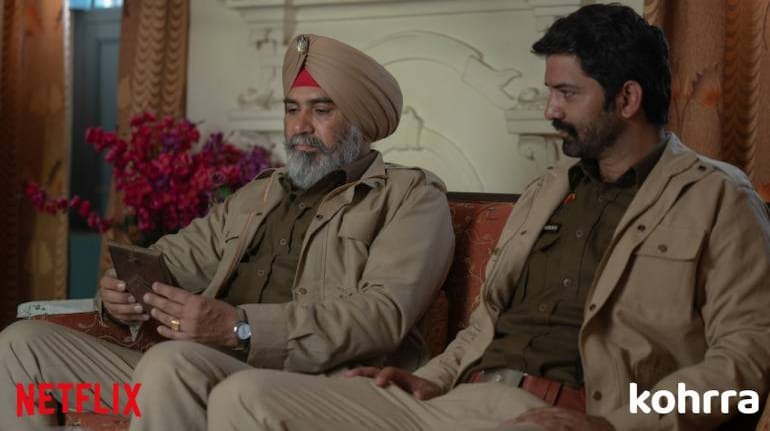



In a scene from Netflix’s Kohrra, two police officers share common woes. “Ye pyaar badi fu**u cheez hai,” the senior says, having arrived at a personal revelation of sorts. There is no learning in life without living with the consequences of social illiteracy. You can only really accept love after maybe you have exhausted every avenue for hate. For most of us, it symbolizes a kind of eventual surrender, a point from where it becomes impossible to carry both grudges and wounds. To others, however, it’s the point from where life begins. Kohrra is a set in Punjab, amidst the state’s NRI population but is also a studious, at times caustic analysis of love and its violent, more despairing descendants. Hate, anger, jealousy, the show argues are simply distillations of an emotion we tend to refer through benevolent lenses. Wipe it clean and you see a whole different world.
Kohrra follows two policemen, Balbir and Garundi. Played by Suvinder Vicky, Balbir is a relic, and old cog in the country’s law-enforcing machine. Unfulfilled potential, a failed marriage and a rebellious daughter weigh down on the ageing man as he compensates for his waning physical prowess, with the stirring intensity of his face. Balbir is supported by Garundi (Barun Sobti), a young, loose cannon, who goes around physically accosting people. The two must investigate the death and disappearance of Paul and Liam (an expat), who had come to India for the former’s marriage. The investigation into the case is a fairly routine examination of India’s crooked justice system, except the men and women caught in its throws are anything but. So dense, and studious is the writing here that the mystery of a fateful night merely acts as the bumper sticker for a deeper, more discomforting reveal of love’s many hot-blooded, questionable manifestations.
Created by Gunjit Chopra, Sudip Sharma and Diggi Sisodia, Kohrra is a comprehensive survey of a land cursed by stark cultural contradictions. Privilege and penury co-exist as escape takes the form of either a needle or a flight ticket. A restaurant named ‘Amreeka Return Cafe’ recurs in the show; a cultural Xerox of American diners, it echoes the paradox of Punjab, a place that as many are willing to die for as they wish to leave. It’s this paradox that becomes the cultural manual for this intricate drama that, true to Sharma’s history as a creator (Pataal Lok and Udta Punjab), isn’t afraid to stare at the sun. Provocations are easy to come by as sex, violence, and drugs punctuate, in graphic detail at times, the loneliness of those who struggle to fit in. Here the bandage of performative sobriety reveals far graver injuries and injustices than the central investigation of a crime. The victim and perpetrator are often the same person, who approaches life through contrasting vocabularies.
Taut direction, a sprawling but cogent script and exceptionally fleshed out characters add meat to a broody visual language. The narrative successfully mines the culture, be it through its visuals or music, and is assisted by a near perfect cast. Varun Badola and Manish Chaudhuri are excellent as unruly patriarchs trying to raise seemingly soft sons in a toxic monoculture that overdoses on visas and drugs in equal measure. Suvinder Vicky is brilliant as tan ageing policeman, the only one in the series other than Paul, with a flashback that specifically casts him as a victim of his own doing. As if life with all that resentment and guilt is as painful as living with a knife, lodged in the heart. There is probably no way of mending anything before bleeding to within an inch of your life.
While Vicky is excellent, Barun Sobti as the cocksure, restless young cop is extraordinary in a performance that will take the rest of 2023, some doing to upstage. He is nerveless and crude, a one-man punching machine, whose alacrity echoes a certain tragicomic beauty. It’s a path-breaking performance for an actor who has quietly put together a commendable resume over the last few years. Here he really steals the show.
Kohrra might have the suggestive skin of a true crime mystery, but it is rooted in the essence of drama. Full of living, breathing characters, authentically replicating a culture’s whims and tone, this is a six-episode sojourn into the dreary depths of human fallibility. Even its ugliness swears by a kind of derelict beauty. It is also a narrative that aspires to comment on our understanding of love, about the unfulfilled prophecies that people will into existence without ever actually living them. Love, after all, is this strange emotion that remains in view, but never quite in sight; this inexplicably shapeless thing that can be seen differently, often in the same moment by the same two people. It’s precisely why Garundi declares to Balbir, half-drunk, “It’s strange how we don’t understand our own families over a lifetime.” Kohrra is masterful story that somewhat wipes that mist clean. The choice to look at what it reveals, however, remains ours.
Kohrra is now streaming on Netflix.
Discover the latest Business News, Sensex, and Nifty updates. Obtain Personal Finance insights, tax queries, and expert opinions on Moneycontrol or download the Moneycontrol App to stay updated!
Find the best of Al News in one place, specially curated for you every weekend.
Stay on top of the latest tech trends and biggest startup news.